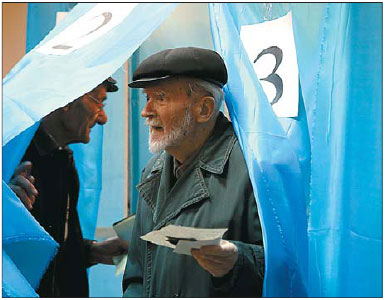Dialogue for Crimea urged
|
A man leaves a polling booth during the referendum on the status of Ukraine's Crimea in Simferopol, capital of the autonomous republic, on Sunday. Voters are expected to be in favor of joining Russia. Sergei Karpukhin / Reuters |
China calls for mechanism of intl coordination
China should help mediate among parties in the Crimea crisis as a referendum on Sunday is expected to renew tensions among the world's major powers, experts said.
Some 1,200 polling stations opened on Sunday in the autonomous republic in Ukraine, with the final result expected to be announced on Monday.
However, Crimean authorities predicted that voter turnout would be at least 80 percent and an overwhelming majority would support joining Russia. Crimea is predominantly ethnically Russian.
Sun Zhuangzhi, a senior researcher of Russian and Central Asian studies at the Chinese Academy of Social Sciences, said the referendum will mark a watershed in the Ukraine political crisis.
"After the vote, the interim Ukraine government is likely to take tough countermeasures, which will further trigger domestic nationalist emotions and result in deeper ethnic divisions and confrontation."
"Crimea is about Russia's strategic bottom-line interests, while the US is attempting to keep its influence in the region," he said.
He said how nations react to the result of the referendum, and how the West handles relations with Russia, will greatly affect the strategic pattern of the whole continent.
Yang Cheng, deputy director of the Center for Russian Studies at East China Normal University in Shanghai, said China - which is a permanent member of the United Nations Security Council and keeps close relations with Russia and good ties with the European Union, the US and Ukraine - can help ease the crisis.
"China should keep its current neutral status and actively promote reconciliation."
Beijing called on Sunday for a political solution instead of confrontation after Moscow vetoed on Saturday a UN Security Council draft resolution, drawn up by the US, that declares the referendum invalid. China abstained from voting.
"China does not agree to a move of confrontation," Foreign Ministry spokesman Qin Gang said.
"The vote on the draft resolution by the Security Council at this juncture will only result in confrontation and further complicate the situation," Qin said, explaining why China abstained from the vote.
Qin said Beijing took the complex causes for the situation into consideration when making its decision.
"China holds an objective and fair position on the Ukraine issue," Qin said.
He urged all sides to establish an international coordinating mechanism to explore means to a political settlement.
Li Jianmin, a Russian studies researcher at the Chinese Academy of Social Sciences, said tensions between Moscow and Washington on the issue are unlikely to escalate into real confrontation.
"Their relations are certainly affected. But due to their intertwined interests, ties will finally recover," Li said.
She said the West is likely to impose sanctions on Russia, but it won't destroy their relations.
However, Washington will not soften its stance in the short term, said Yang from East China Normal University.
"It's not only about Crimea, it's about principle. If the US weakens and changes its stance, its allies will doubt whether it can protect their interests. That will have a long-term impact on US interests," Yang said.
He said so far the US is prepared for sanctions against Russia, which are likely to be followed with tougher ones.
"Sanctions from Europe or the US might affect Russia's stocks market, and Russia might respond with energy sanctions."
Russia supplies about one quarter of Europe's oil and natural gas, not to mention 40 percent of economic powerhouse Germany's gas.
Contact the writers at lixiaokun@chinadaily.com.cn and renqi@chinadaily.com.cn



















